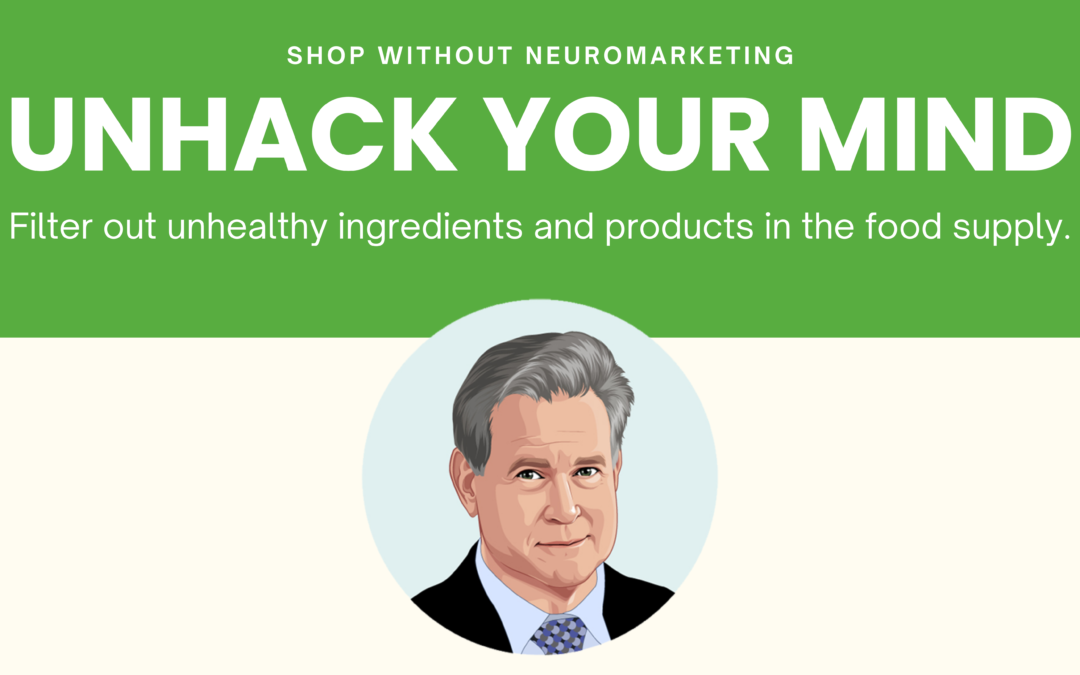
Obesogens: a unifying theory for the global rise in obesity
- Obesity is biochemistry.
- The behavior is a result of the biochemistry.
- Bad diets cause obesity through REDOX generation.
- Prevention is the only solution.


UNHACK YOUR FOOD AND BEVERAGE PURCHASING
Did you know there is a “science” to hacking your mind and your purchasing behavior? It is called “neuromarketing,” and it is being deployed by an army of marketing specialists who have made it their business to manipulate your decisions regarding purchases of foods and beverages.
When “Hacking of the American Mind” was published in 2017, I pointed out that in the last forty years, government legislation and subsidies have promoted ever-available temptation (sugar, drugs, social media, porn) combined with constant stress (work, home, money, Internet), with the end result of an unprecedented epidemic of addiction, anxiety, depression, and chronic disease. And with the advent of neuromarketing, corporate America has successfully imprisoned us in an endless loop of desire and consumption from which there is no obvious escape.
But now there is an obvious escape, at least from harmful foods and beverages.
Simply filter them out effortlessly, using cutting-edge new technology that works in the opposite way that neuromarketing does.
I have worked with an innovative new startup called Perfact to develop paradigm-shifting tools that empower you and your knowledge about foods and beverages to make rational, informed decisions based on science-based criteria easily and quickly.
My new “no added sugar” solution filters out 74% of packaged goods in the food supply that contain added sugar. With 262 forms of added sugar currently in the food supply, reducing sugar consumption by simply reading the labels would be an impossible task.
I also provide a “safe added sugar filter” that allows just enough sugar to stay within guidelines established by leading health authorities. Once you eliminate products with added sugar, you might also want to consider what types of sweeteners are used, so I provide several filters for these ingredients as well.
I’m asking everyone in our movement to try out the FREE Perfact solutions and to help provide feedback on the experience. It is a new technology, supporting consumers in a fundamentally new way, so please become part of this important movement to unhack your shopping experience, transform the way you shop, and change the food system for the better.
Simply click here and visit my website to learn more and try out the Perfact filters for FREE and with no cumbersome sign-up required!

The food choices we make have a major influence on our health and environment and the welfare of the people and animals who ultimately make our food.
Nevertheless, research and education efforts haven’t yet resulted in a major shift in food buying patterns. We want to know more about your goals and ideals when buying food – and what prevents you from fulfilling them.
Along with the Hypoglycemia Support Foundation, I support this survey sponsored by perfact.co, a startup that seeks to take the guesswork, challenges, and pain out of finding the products that are right for you without compromising your privacy or “paying with your data”.
Years in the making, check out the survey results to date. Over 2,000 respondents so far!
http://surveyresults.perfact.
If you haven’t taken the survey yet, there is a link at the bottom of the survey results page.
Sincerely,
Dr. Robert H. Lustig
Ultraprocessed food is established as a metabolic disruptor acting to increase adiposity, reduce mitochondrial efficiency, drive insulin resistance, alter growth, and contribute to human morbidity and mortality. Consumer packaged goods (CPG) companies are beginning to understand the detrimental impact of the food they market, and have employed substitution strategies to reduce salt, sugar, and fat. However, the harms of ultraprocessed foods are far more complex than any single component, and are not ameliorated by such simple substitutions. Over the past 2 years, the authors have worked with the Kuwaiti Danish Dairy Company (KDD) to conduct a comprehensive scientific evaluation of their entire commercial food and beverage portfolio. Assay of the macronutrients, micronutrients, additives, and toxins contained in each of their products was undertaken to determine the precise nature of each product’s ingredients as well as the health impacts of processing. The authors formed a Scientific Advisory Team (SAT) and developed a tiered “Metabolic Matrix” founded in three science-based principles: (1) protect the liver, (2) feed the gut, and (3) support the brain. The Metabolic Matrix categorizes each product and provides the criteria, metrics, and recommendations for improvement or reformulation. Real-time consultation with the KDD Executive and Operations teams was vital to see these procedures through to fruition. This scientific exercise has enabled KDD to lay the groundwork for improving the health, well-being, and sustainability of their entire product line, while maintaining flavor, economic, and fiscal viability. This process is easily transferrable, and we are sharing this effort and its approaches as a proof-of-concept. The key aim of our work is to not only make ultraprocessed food healthier but to urge other food companies to implement similar analysis and reformulation of their product lines to improve the metabolic health and well-being of consumers worldwide.
In the podcast Sugar – A Chronic Toxin? I discuss with @lizctucker how the sugar fructose is addictive, drives fatty liver disease, and accelerates the aging process.
Recent Comments